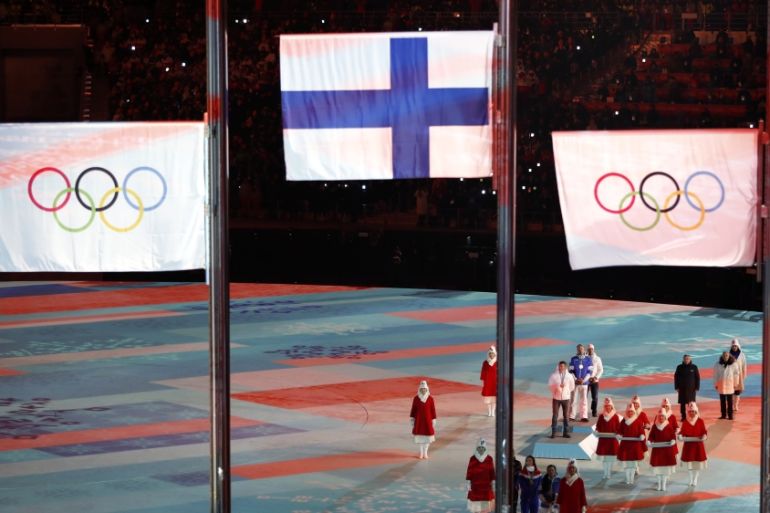The price of Russia’s absence from the 2018 Winter Olympics
Russia has been banned from the Winter Olympics and the Paralympics due to doping violations.

Seoul, South Korea – In a gritty commercial area in Seoul’s Dongdaemun District in the city’s northeast, there’s a cluster of streets where the signboards are more likely to be in Cyrillic than Korea’s Hangul script.
Beside all the restaurants are the businesses that cater to Russians and Central Asians from the former USSR.
Keep reading
list of 4 itemsZelenskyy says Olympics chief should visit Ukraine front line
Arif Khan: A Kashmiri youth’s struggle for Olympic dream
Photos: Curtain closes on Paralympics as China and Ukraine star
Here, merchants had hoped that the late winter would be a time of brisk business – throughout February and March this year, South Korea is hosting the Winter Olympics and Paralympics.
Normally, the two events would see a large Russian presence – 232 Russian athletes took part in the 2014 Winter Olympics and 177 in the 2010 Games.
But due to repeated doping violations, Russia was banned by the International Olympic Committee.
“Clean” Russian athletes were allowed to compete, but there was no official Russian delegation. Similarly, when the Paralympics kick off on Friday, only 29 Russian athletes will be participating.
In South Korea, to use the phrase “Russian community” is to miss the mark. Locals say “Russian-speaking community” is more apt, as it is inclusive of people from former Soviet states, including Uzbekistan and Kazakhstan.
This Russian-speaking neighbourhood was formed by traders from the former Soviet Union who came to South Korea for business, including selling leather and furs. The area is also populated by ethnic Koreans from Central Asia who have come here to work.
Russia Mart sells imported items such as Russian cheese, sausage and vodka, as well as classic Russian dolls and books. A middle-aged ethnic Korean woman from Uzbekistan works in the store.
She said she noticed a small uptick in business since the start of the Olympics. But nothing major.
Oleg Efimov, a translator from St Petersburg, has lived in Seoul for 11 years.
He had hoped the Olympics and Paralympics would lead to more work for him since he envisaged a higher Russian presence at the Games that would require his translation services.
So far, he has been disappointed.
“I was expecting to get more translation jobs because of the Olympics,” said Efimov.
“I was expecting a more festive, Olympics-kind of atmosphere, but there hasn’t been much of anything.”
Russia and South Korea established diplomatic relations after the fall of the Soviet Union; today, they have strong, productive ties.
Russian officials have worked to develop commercial relations with South Korean companies in an effort to develop the vast Russian Far East, whose main cities of Vladivostok and Khabarovsk are closer to Seoul than Moscow.
Recent years have seen growing numbers of tourists travelling between the two countries. This is due in part to a visa-free programme started in 2014 that allows tourists to stay in either country for up to 60 days.
South Korea’s tourist industry has looked more to Russia over the past year, as the number of visitors from China dropped due to a diplomatic dispute over a US missile system.
![Russian athletes enjoyed a fair bit of support inside the arena [Damir Sagolj/Reuters]](/wp-content/uploads/2018/03/8dd0f9979f4f4a4385ba55fc7babd566_18.jpeg)
“Russia has become popular for Korean tourists in the last two years, and the number of Russian tourists who visited Korea in 2017 was 15 percent higher than in 2016. This is due to the stabilisation of the economic situation and increase in the number of flights to Korea,” a Korea Tourism Organization (KTO) official told Al Jazeera.
While the exact number of Russians attending the Pyeongchang Olympics and Paralympics remains unknown, the KTO said they had targeted Russians in the country’s east as part of their promotional campaigns.
“The Russian Far East is close to Korea. Many people have travel experience in Korea and are familiar with Korea. So we think these Russian tourists are not afraid to go to the Games.”
Economic impact
In December 2017, the IOC banned Russia from the Pyeongchang Olympics as punishment for a government-run system of doping that gave Russian athletes an unfair advantage at the 2012 and 2014 Olympics.
A ban for the Paralympics followed, due to doping allegations that the International Paralympic Committee described as “an orchestrated attack on the integrity of sport”.
The IOC then later determined that the ban was unfair to Russian athletes who did not dope and agreed to allow Russian athletes to compete if they could pass an additional drug screening.
In terms of economic impact, Russia’s ban could be positive for the Olympics in the long run, according to Matthew Robinson, professor of sport management at the University of Delaware and director of the International Coaching Enrichment Certificate Program.
“For top sponsors, it may hurt these games, but by Tokyo 2020, this will have restored some credibility to the Olympic movement by levelling the playing field,” said Robinson.
“Athletes want to compete against the best, but they want that competition to be fair.”
|
|